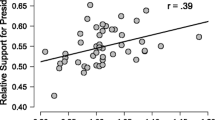Abstract
Some of the methods for data collection in experimental psychology, as well as many of the inferences from observed behavior or image scanning, are based on the implicit premise that language use can be linked, via the meaning of words, to specific subjective states. Wittgenstein’s well known private language argument (PLA), however, calls into question the legitimacy of such inferences. According to a strong interpretation of PLA, all of the elements of a language must be publicly available. Thus the meaning of words is not fixed by reference to our private experiences, and so data from subjective state claims indicates nothing about our subjective experiences. Application of PLA to psychological studies based on descriptions of the experience of orgasm offers support for the strong version of the conclusion of PLA. We show that PLA has deep implications for data collection methods and inferences in experimental psychology. In particular we critique two contemporary research projects in neuroscience: one studying the ability to remember emotionally loaded words and the other studying experience of attraction. Both of these projects attempt to link subjective experiences and thought processes to particular observable brain states. The research methods appeal to (implicit) inferences from linguistic usage to subjective states. Application of PLA will show that such inferences cannot be made because the meaning of a word is not determined by any subjective state of the speaker.
Similar content being viewed by others
References
Aguirre G.K. (2003). Functional imaging in behavioral neurology and cognitive neuropsychology. In: Feinberg T.E., Farah M. J. (eds). Behavioral neurology and cognitive neuropsychology. McGraw-Hill, USA
Aharon I.N., Ariely E.D., Chabris C.F., O’Connor E., Breiter H.C. (2001) Beautiful faces have variable reward value: fMRI and behavioral evidence. Neuron, 32: 537–551
Baddeley A. (1990) Human memory: Theory and practice. Allen & Bacon, Boston
Brierley B., Medford N., Shaw P., David A.S. (2007) Emotional memory for words: Separating content and context. Cognition & Emotion 21(3): 495–521
Canfield J.V. (1996) The community view. The Philosophical Review 105: 469–488
Eisenthal Y., Dror G., Ruppin E. (2006) Facial attractiveness: Beauty and the machine. Neural Computation 18(1): 119–142
Fogelin, R. (1987). Wittgenstein. NY: Routledge and Kegan Paul.
Geller J. (1987–1988) Introspection in psychology and philosophy. Philosophy Research Archives 13: 447–448
Gert B. (1986) Wittgenstein’s private language arguments. Synthese 68: 425–426
Godden D., Baddeley A.D. (1975) Context-dependent memory in two natural environments: On land and underwater. British Journal of Psychology 66: 325–331
Hacker P.M.S. (1986) Insight and illusion. Clarendon Press, Oxford
Hanfling O. (1984) What does the private language argument prove? Philosophical Quarterly 34: 472
Kampe K.K.W., Frith C.D., Dolan R.J., Frith U. (2001) Reward value of attractiveness and gaze. Nature 413: 589
Kawabata H., Zeki S. (2004) Neural correlates of beauty. Journal of Neurophysiology 91: 1699–1705
Kenny A. (1973) Wittgenstein. Harvard University Press, Cambridge, MA
Kensinger E., Corkin S. (2003) Memory enhancement for emotional words: Are emotional words more vividly remembered than neutral words? Memory and Cognition 31(8): 1169–1180
Law S. (2004) Five private language arguments. International Journal of Philosophical Studies 12: 159–176
Locke J. (1991) An essay concerning human understanding. Clarendon Press, Oxford
Mah K., Binik Y.M. (2002) Do all orgasms feel alike? evaluating a two-dimensional model of the orgasm experience across gender and sexual context. The Journal of Sex Research 39: 105
Maratos E.J., Allan K., Rugg M.D. (2000) Recognition memory for emotionally negative and neutral words: An ERP study. Neuropsychologia 38: 1452–1465
McNamara, A. (2003). The neural correlates of facial attractiveness poster #476 presented at Cognitive Neuroscience Society. Poster can be found at file://E:\NeuroImage\abstract\blank\htm.
O’Doherty J., Winston J., Critchley H., Perrett D., Burt D.M., Dolan R.J. (2003) Beauty in a smile: The role of the medial orbitofrontal cortex in facial attractiveness. Neuropsychologia 41: 147–155
Pears, D. (1969). Ludwig Wittgenstein (Modern Masters). NY: Viking Press.
Proctor, E. B., Wagner, N. N., & Butler, J. C. (1976). The differentiation of male and female orgasm: An experimental study. In J. Leslie & D. Copeland (Eds.), Modern views of human sexual behavior. Chicago: Science Research Associates (Reprinted from Perspectives in human sexuality, pp. 72–81 by N. N. Wagner (Ed.), 1974. NY: Human Science Press).
Russell, B. (1985). In D. Pears (Ed.), The philosophy of logical atomism. LaSalle, IL: Open Court.
Vance E.B., Wagner N.N. (1976) Written descriptions of orgasm: A study of sex differences. Archives of Sexual Behavior 5: 87–98
Werhane P. (1992) Skepticism, rules, and private language. Humanities Press, NJ
Wittgenstein, L. Philosophical investigations. Trans. GEM Anscombe.
Zaidel D.W., Cohen J.A. (2005) The face, beauty and symmetry: Perceiving asymmetry in beautiful faces. International Journal of Neuroscience 115(8): 1165–1173
Author information
Authors and Affiliations
Corresponding author
Rights and permissions
About this article
Cite this article
Meyers, C.D., Waller, S. Psychological investigations: the private language argument and inferences in contemporary cognitive science. Synthese 171, 135–156 (2009). https://doi.org/10.1007/s11229-008-9382-y
Received:
Accepted:
Published:
Issue Date:
DOI: https://doi.org/10.1007/s11229-008-9382-y




